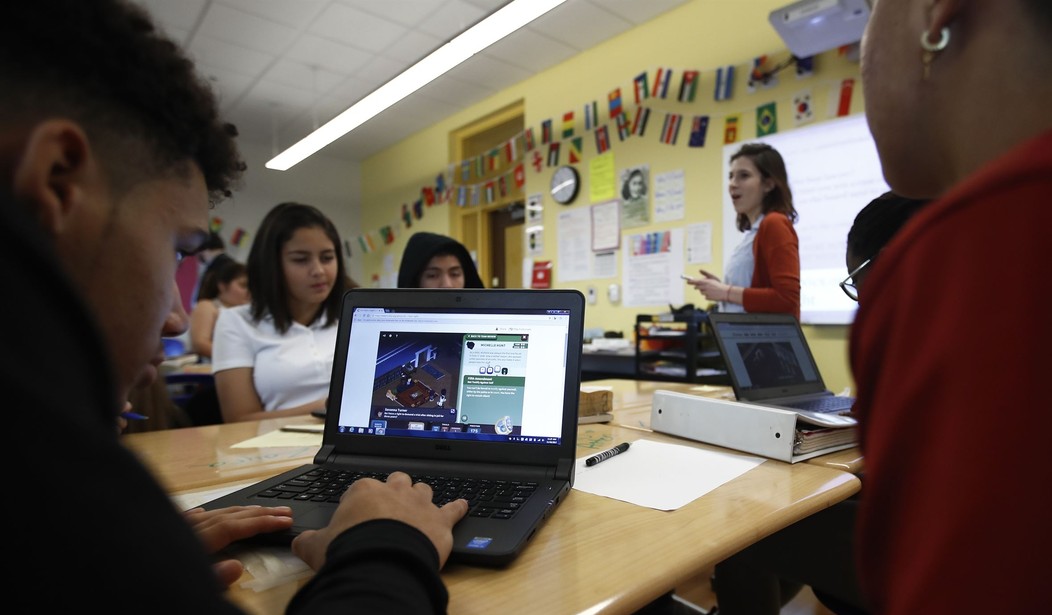American education is in crisis. Almost everyone agrees on that but no one agrees on why. “It’s those damn liberals,” say some. “It’s white privilege!” say others.
It’s the unions, it’s not spending enough money, it’s parents, it’s “cultural,” — all explanations for why our schools are failing the country dance around the primary reason for the decline.
“Everything is politics,” said the German author Thomas Mann. The author of Reflections of an Unpolitical Man was writing of a time when politics had failed and the world was consumed in the First World War. But he may have just as easily transported his critique to the present day.
We are besotted with politics. It’s in our personal life, our professional life, it’s in our family, our neighborhood, our church — you can’t escape it. You will be forced to care even if you want to be left alone. You may not be interested in the sexual orientation of someone you just met, but chances are they’ll tell you before too long.
Why? Because it’s political. Politics colors every aspect of American life, including the bedroom. The politics of the bedroom used to be between two people — power arrangements, accommodations, compromises. Two people — usually a husband and a wife — were perfectly capable of working out bedroom politics on their own. In private. Now, sex between married people who love each other is a war between the representative of a dominant hierarchical system and a member of the oppressed minority.
There are no “safe spaces.” Making a space “safe” is a defining political statement. Going to a “safe space” to be “safe” is an expression of political identity. How can you be “safe” when so many disagree with you?
While elites are engaged in a battle for which incomplete caricature of American history will be taught in schools, students tune out, bury their heads in their smartphones, and text about the latest cultural phenom. They don’t care. The debate over which version of history will be taught doesn’t concern them because they have no frame of reference to place the people, events, ideas, and perspectives in any kind of understandable order. It’s like reading about people from another planet.
It’s bad enough that civic education is in the tank. In the most recent national testing, only 24% of 8th graders were “proficient” or better in U.S. history, while a pitiful 15% were proficient in government and civics. Only one-third of Americans can pass the basic citizenship test. Funding for civic education is a pittance, as the federal government spends five cents per student per year on it, while investing $54 per student on STEM (science, technology, education and math) education.
The consequences of this ignorance will be profound. One ignorant generation begetting another and another until the film Idiocracy becomes more than fiction. The film tells the story of a 21st-century man transported to a future America where everything is breaking down and society is in chaos because no one knows how to fix things or even how society is supposed to operate. The results are comedic but chilling. That could be why 20th Century Fox abandoned the film, which, instead of hauling in a big gross, has become a cult classic.
Students have no idea of how the United States is supposed to work. Teaching the basics of the American government requires a perspective on history that’s lacking in all but honors programs.
The point is that battles over political correctness are not what students need in order to improve their civic education. Our lack of national civic knowledge speaks clearly of the need to learn the basics first. As Professor Sam Wineburg of Stanford University has said, younger students “do not get the interpretive game [and] are just learning that claims must be judged not for alignment with current issues of social justice but for the data they present.” It is in college where students are best prepared to read multiple accounts from different perspectives and make comparisons and judgments.
It was hard to create a free country. It’s proven even harder to keep it. I wonder if my parents’ generation — the World War II generation — looked at us when we were kids and asked the same question. How can we bequeath what we’ve built to a bunch of long-haired hippie freaks? As it turned out, a lot of those hippies sobered up when they had families and became good citizens. The boomers deserve a lot of criticism, but most of them eventually grew up and were stewards of the United States during the most spectacular advances in the economy, technology, and human understanding in world history.
What will they say about this generation in a few decades?
Tara Reade: ‘Unspeakably Hard’ to Watch Biden Become President












Join the conversation as a VIP Member